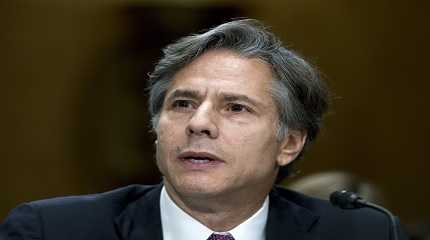
JOHANNESBURG (AP) — The United States sees Africa’s 54 nations as “equal partners” in tackling global problems, U.S. Secretary of State Antony Blinken said in South Africa Monday.
“Our strategy is rooted in the recognition that sub-Saharan Africa is a major geopolitical force — one that has shaped our past, is shaping our present, and will shape our future,” Blinken said at the University of Pretoria in a speech detailing the Biden administration’s policies for Africa.
“It’s a strategy that reflects the region’s complexity, its diversity, its agency; and one that focuses on what we will do with African nations and peoples, not for African nations and peoples,” he said.
Blinken said that the United States and African nations “can’t achieve any of our shared priorities — whether that’s recovering from the pandemic; creating broad-based economic opportunities; addressing the climate crisis; expanding energy access; revitalizing democracies; or strengthening the free and open international order — if we don’t work together, as equal partners.”
South African academics and students responded warmly to Blinken’s speech, which was a broad declaration of U.S. intentions toward sub-Saharan Africa. The United States is often faulted for overlooking the continent in recent decades, opening space for Russian and Chinese interests to make significant inroads.
The United States’ top diplomat is in South Africa as part of a three-nation tour of Africa including Congo and Rwanda in what is seen as a contest between Western nations and Russia to win support from African countries over the war in Ukraine.
Blinken’s tour follows recent trips to African countries by Russian Foreign Minister Sergey Lavrov and French President Emmanuel Macron.
South Africa is among many African countries that have taken a neutral stance on the Ukraine war.
Before his speech, Blinken met in Pretoria, South Africa’s administrative capital, with Minister of International Relations Naledi Pandor. Pandor appears to have maintained her country’s refusal to criticize Russia for its invasion of Ukraine. Instead, in a press briefing following the meeting, Pandor criticized the U.S. and other Western powers for focusing on the Ukraine conflict to the detriment of other international issues.
“We should be equally concerned at what is happening to the people of Palestine, as we are with what is happening to the people of Ukraine,” she said.
Before the closed-door meeting with Pandor, Blinken had said that the United States’ good relations with South Africa would allow them to be frank in discussing their differences.
Many African countries have declined to follow the U.S. lead in condemning the Russian invasion of Ukraine. Some were among more than a dozen African governments that have signed security deals with the Wagner Group, a shadowy Russian mercenary group that the U.S. and other countries say is backed by the Kremlin.
Sub-Saharan nations also have been major recipients of Chinese investment through its “Belt and Road Initiative,” which supports infrastructure developments.




